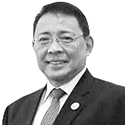
Signs And Wonders
By Diwa C. Guinigundo

Last Thursday, the Yuchengco Center, through its president, our old friend Dr. Milton Amayun, invited us to speak on what the Bible has to say about eliminating poverty in the Philippines. It was a tall order because many of us come from the worldview that poverty, like income inequality and low standard of living, is nothing more than a symptom of a broken system, an inexorable outcome of bad governance. Corruption in public service pulls back economic growth and prevents broader inclusive access to both political and business opportunities.
We agreed with that assessment, but we immediately clarified that Scripture actually goes beyond that.
True, as South Africa’s Nelson Mandela once quipped, “poverty is not an accident, like slavery and apartheid, it is man-made and can be removed by the actions of human beings.” But that point actually makes poverty intractable because when men have abandoned decency and integrity in public service, addressing poverty becomes an impossible task. At least when we fight the windmills, we see them when they actually give up. And when working men start with cheap talk rather than hard work, and those in authority fight poverty with generics of commitment, poverty gets more entrenched even in the mindset of those who are considered poor.
Three things are important about poverty.
First, poverty has never been the plan of God for men. Based on the biblical worldview, God created the heavens and the earth for men, and it is His ultimate plan for them to take dominion and benefit from God’s wonderful creation. This is clear in Genesis. In Jeremiah 29:11, God assured us that His plan is not to harm us but to prosper us and to secure our future. In fact, in Deuteronomy 8:18, God gave us the power to get wealth. If indeed, God wants us to prosper and He gave us the power to get wealth, there is no reason to believe that poverty is part of God’s plan.
Second, poverty is actually a curse. It derives from man’s disobedience that, in Deuteronomy 28, consists of not doing God’s commandments and His statutes. Obedience ensures blessings. That means the right conditions for planting and harvest will happen, rains will come at the right season, the works of our hands will prosper. It’s not fair to conclude that God is unreasonable because if we grant the premise that He created everything, it is His rules of engagement that must be followed.
And finally, Jesus Himself bore the curse of sin, including that of poverty, to deliver men from its curse. He became poor so that we may become rich. How did Jesus become poor sounds mysterious because there is no evidence that Jesus and his family were poorer than those of most other families during His time. He became poor by voluntarily becoming a man, giving up His rights and privileges as God. He became subject to human limitations. Jesus was therefore exalted that even those who believe in Him will do greater works than He had done, as Philippians 2:5-11 clarifies.
True, the Philippines has succeeded in reducing poverty in the last 30 years following our respectable economic growth and structural transformation in the Philippine economy. Job opportunities became more accessible and poverty incidence declined from 49.2% in 1985 to 16.7% in 2018. But income inequality seems to persist. The so-called income Gini coefficient of 42.3% betrays the fact that we have one of the highest income inequalities in the world. The wealthiest 1% among us capture 17% of all income generated while the bottom 50% have to share only 14%. No wonder, our resiliency was not enough to reverse the impact of the pandemic. Poverty worsened from 16.7% to 18.1% in 2021.
This means some 20 million Filipinos live below the monthly P12,030 poverty threshold. The same Philippine Statistics Authority Family Income and Expenditure Survey of 2021 also documents that over 6.5 million Filipinos are so poor their income is not enough to meet just the basic food needs amounting to at least P8,379 per month.
How does one become poor?
Both the Old Testament and the New Testament explain the origin of poverty. Being lazy, working half-heartedly, or refusing to work could lead to poverty as 2 Thessalonians 3:10 teaches us. Engaging in vices and foolish behaviors; nurturing pride and forgetting God especially in times of plenty; hiding one’s sins; loving money and being greedy; being selfish and being stingy; and being fearful are the other drivers of poverty. Finally, generational curses also bring about material deprivation. Exodus says that if our ancestors were once upon a time engaged in idolatry or demonic activities, it is likely that succeeding generations will find it difficult to break through. As Derek Prince once likened sin to a dam, sin can hold back waters of blessings.
We presented some anecdotal evidence on how God or religion is doing in the Philippines, while admitting the difficulty of rigorously establishing robust correlation between religious conviction and poverty incidence. But one can see that the national Social Weather Survey of November 2020 found that 73% of adult Filipino respondents said religion is very important while 15% found it not at all important.
What should interest us are two things. One is the actual decline of those who still hold on to religion as important to 73% from the previous 83%, as polled in December 2019 despite the surge of the pandemic. The other is the increase from 7% to 15% of those who said religion is not important at all. In fact, this is consistent with the dwindling of weekly attendance in religious services to a minority.
Fighting poverty from a biblical perspective actually corresponds perfectly with current worldview of poverty and how to address it, with some differences.
No one should dispute that the principle of planting seed and harvest, of sowing and reaping, is of practical application even in the secular world. Investing plenty and wisely should come back with a lot of vengeance.
We recall the story of Kenneth Copeland who at the time was a student at Oral Roberts University in Tulsa, Oklahoma. He wanted to partner with Kenneth Hagin who preached about sowing and reaping. Hagin challenged the audience to partner with him and plant a seed in his ministry. Copeland did not have anything with him except a pencil that came with the offering envelope. So much desiring to partner with Hagin, Copeland put the pencil, that which was everything he had, inside the offering box. Before the end of the day, someone gave Copeland a $10 bill.
The biblical admonition not to be fearful, as 2 Timothy 1:7 and Luke 8:50 would remind us, corresponds to taking risks in order to leverage on vast business opportunities. Good stewardship in Matthew 25:14-30 and Proverbs 22:7 being rewarded is a prime mantra in all business settings that warrant higher salaries, fat bonuses, and profit sharing. It should not be a puzzle that modern management techniques have invariably biblical provenance.
What differentiates the biblical worldview from the contemporary worldview is perhaps the principle of making God our business partner. Tithing and offering to God means returning to Him what is due Him as our business partner, not something that He should be thankful for. Abraham in Genesis offered a tenth of his spoils from war to the High Priest Melchizedek while declining the offer of the king of Sodom to keep his wealth. Abraham boldly refused lest people should say his wealth came from Sodom. For his act of faith, Abraham did not only produce a son in Isaac, but he was also rewarded vast riches of inordinate value.
In this connection, God will also bless the occupation and business of those who align their priorities with God and His word, those who keep their righteousness in everything they do and those who give to the poor.
God’s plan is to transform the nations and kingdoms of this world into the nations and kingdom of God, Revelation 11:15. The mandate for the people of God to preach the Gospel, to disciple nations, to baptize, and to teach everything Jesus taught us can only be executed if God’s people are one in helping expand God’s kingdom through direct involvement in politics and business, in arts and culture, in education and health. Money is needed to spread His word.
Poverty will never glorify God because it is a solid impediment to His vision to see the nations transformed and the hearts and mind of men renewed.
Diwa C. Guinigundo is the former deputy governor for the Monetary and Economics Sector, the Bangko Sentral ng Pilipinas (BSP). He served the BSP for 41 years. In 2001-2003, he was alternate executive director at the International Monetary Fund in Washington, DC. He is the senior pastor of the Fullness of Christ International Ministries in Mandaluyong.